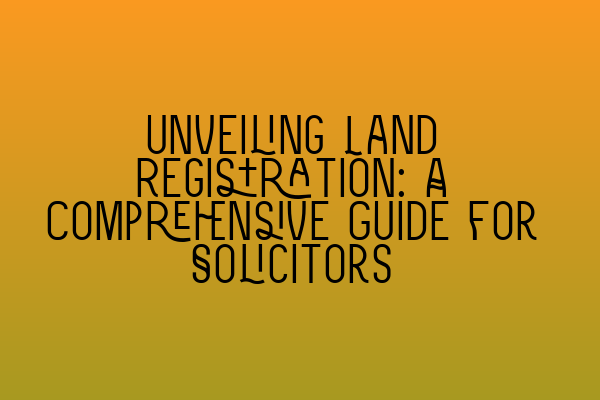Unveiling Land Registration: A Comprehensive Guide for Solicitors
Introduction
Land registration is a critical aspect of property law, and as a solicitor, it is crucial to have a thorough understanding of this complex process. In this comprehensive guide, we will delve into the intricacies of land registration, providing you with the knowledge and insights necessary to navigate this area of law with confidence. Whether you are a seasoned solicitor or a aspiring law student, this guide will be invaluable to your practice and studies.
Understanding the Basics
Before we dive into the details, let’s start with the basics of land registration. In simple terms, land registration is the process of recording ownership and interests in land. It is a fundamental aspect of property law, ensuring transparency and certainty in property transactions. In the United Kingdom, land registration is governed by the Land Registration Act 2002, which sets out the procedures and requirements for registering land.
The Importance of Land Registration
Land registration offers numerous benefits and plays a crucial role in property transactions. Firstly, it provides an accurate and up-to-date record of ownership, making it easier to establish who owns a particular piece of land. This eliminates the need for costly and time-consuming investigations into title. Furthermore, land registration facilitates the smooth transfer of property, as buyers can rely on the registered title without the need for extensive due diligence. Lastly, land registration promotes transparency and protects against fraud, as any changes to the registered title must be properly documented and verified.
Key Concepts and Terminology
To effectively navigate land registration, it is essential to familiarize yourself with key concepts and terminology. Some important terms include:
1. Title Register: This document shows details of the registered owner, the description of the property, and any registered interests or charges affecting the property.
2. Proprietorship Register: This register provides information about the registered owner(s) of the property.
3. Charges Register: This register discloses any charges or mortgages affecting the property.
4. Priority Notice: A notice that can be lodged to protect a pending application or interest for a specified period.
5. Restrictive Covenants: Conditions or restrictions that may be imposed on the use or development of a property.
Land Registration Process
Now that we have a solid understanding of the basics, let’s explore the land registration process in detail. Please note that the process may vary depending on the jurisdiction, so it is important to consult local legislation and guidelines.
1. Preparing the Application: The first step is to gather all relevant information and documentation needed to complete the application. This may include details about the property, previous transfers, encumbrances, and any relevant supporting documents.
2. Completing the Application: The completed application must be submitted to the land registry along with the appropriate fee. It is crucial to ensure the accuracy and completeness of the application to avoid delays or rejections.
3. Examination and Processing: Once the application is received, the land registry will undertake a detailed examination of the submitted documents. This involves verifying the information, conducting searches, and assessing the compliance of the application with legal requirements.
4. Registration: If the application meets all the requirements, the land registry will proceed with the registration. The registered title will be updated to reflect the new owner and any registered interests or charges.
5. Notice to Interested Parties: After the registration, the land registry will send notice to interested parties, such as mortgagees or leaseholders, informing them of the registration and any changes affecting their interests.
Advanced Land Registration Topics
In addition to the basic land registration process, there are advanced topics that solicitors should be well-versed in. These topics include:
1. Adverse Possession: The process by which a person can acquire ownership of land by occupying it for a certain period without the consent of the registered owner.
2. Co-ownership: When two or more individuals jointly own a property, it is essential to understand the different forms of co-ownership and the rights and obligations of each party.
3. Priority of Interests: In cases where multiple interests or charges affect a property, it is crucial to understand the rules and principles governing their priority.
4. Overriding Interests: Certain interests, such as rights of way or leases, may not be registered but still have the power to override a registered disposition.
Conclusion
Land registration is a complex and multifaceted area of law, but with the right knowledge and expertise, solicitors can successfully navigate this field. By understanding the basics, key concepts, and advanced topics, you can confidently advise clients and ensure smooth property transactions. As a solicitor, it is crucial to stay up to date with the latest developments in land registration and continuously enhance your expertise.
If you found this guide helpful, check out our related articles for further insights:
– SQE 1 Practice Exam Questions
– SQE 1 Practice Mocks FLK1 FLK2
– SQE 2 Preparation Courses
– SQE 1 Preparation Courses
– SRA SQE Exam Dates
Should you have any further questions or require professional assistance with land registration or any other property law matters, please do not hesitate to contact us at SQE Property Law & Land Law. Our team of experienced solicitors is here to help you.
